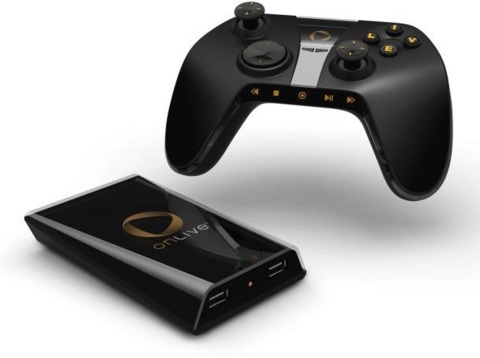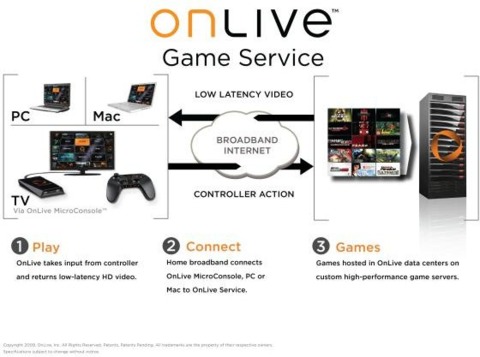OnLive CEO does live demo, launch details 'soon'
DICE 2010: Founder & CEO Steve Perlman puts ambitious game-streaming network through its paces, explains why game consoles and physical media are doomed by a culture of "instant gratification."
Who is the consumer of today? According to OnLive founder and CEO Steve Perlman, it's Eric Cartman. To introduce his DICE Summit keynote address titled "Instant Gratification: Video Games In The 'Now' Era," the executive showed the clip of the corpulent South Park character having a conniption outside a retailer while waiting for the Wii to come out.

"That's the consumer of today," said Perlman, "They want everything right now."
To prove his point, Perlman said that 26.6 percent of all Internet traffic was "real-time entertainment" in 2009--more than double the 12.6 percent share it had in 2008. This is mostly off video-streaming sites such as YouTube and Hulu. But if Perlman has his way, the mix will soon include games via the OnLive game-streaming service, which remains in closed beta testing.
Knowing many business leaders were in the audience, Perlman began his presentation by explaining what happened to industries that were caught unprepared by digital delivery and the ensuing "now" culture. Music was the first "now" medium and suffered since record labels weren't ready for Napster and others when they arrived around the turn of the century. Pirate sites became so prevalent that downloading pirated media became more convenient than buying legit media. Movies and video are in the midst of the transition away from physical media now. Film studios had a better plan but are still getting clobbered by pirate sites.
To prevent the game industry from a similar fate, Perlman urged the audience to abandon the "OldThink," where a device defined a media. He said fewer and fewer people are asking questions such as "What CD is playing?" or commenting "We're watching a DVD tonight." "NewThink" has people describe the band, since most everyone doesn't even listen to CDs anymore. Hardly anything is watched on live television anymore, contended Perlman, with video clips being sampled on YouTube and Hulu, as well as television networks' sites. (He conspicuously did not mention TiVo or other DVRs.)

Perlman went on to say that physical media-based video is in rapid decline, with only interim growth in rentals like Netflix and Redbox. He contended that downloaded media is also past its peak, and even BitTorrent downloads are on the decline. Streaming media is now the majority of all Internet traffic via sites like YouTube and Hulu, but online "linear media"--that is, noninteractive--is a loss-leader for business. Apple says its iTunes and App store are "just over break even," and the company makes its real money on software and hardware. He contended Netflix gives away online videos at no additional cost, but still makes money off its physical-disc subscriptions. YouTube continues to lose money over three years after Google bought it for $1.65 billion, he said.
Though these examples are clear, Perlman said video games are "a different beast than linear media." Players have to download a large file before they can start a game, which is most often tied to a specific playback device. Online games can't be pirated because they are constantly being verified by game companies' servers.
However, Perlman sees clouds on the horizon and pointed out that the game industry is also vulnerable to shifts in consumer habits. Used games continue to grow, with about one third of all US games sold being used, according to industry-research firm Wedbush. Flash and iPhone games provide near instant experiences, but at a fraction of the cost of regular games. Finally, as broadband connections increase number and speed, Perlman predicts online piracy will also--even though just minutes earlier he said BitTorrent downloads were going down.
The executive declared the way to monetize games in the "now" era is to give consumers what they want, when they want it. It is to deliver instant gameplay of high-quality games and eliminate the need for pricey specialized hardware. It is to offer games in smaller "bites"--episodic, short-form events. Finally, increased monetization will come from utilizing the Internet to mitigate piracy by designing games to require an online connection, much like Ubisoft recently announced it would do.
Naturally, Perlman believes the perfect platform for the "now" era is OnLive, which he claimed will offer the latest high-end titles available instantly for play on any device. As outlined in its introduction last March, OnLive doesn't require any expensive hardware--just a cheap converter box for televisions or software for PCs, Macs, and other devices. All the hardware is in the server farm, which is upgraded every six months. He also claimed OnLive's graphical capabilities are already much more powerful than that of the PlayStation 3 or Xbox 360, both of which use hardware that's four or five years old.
His sales pitch concluded, Perlman went on to describe how OnLive works. He turned on a small set-top box with the touch of a button to show off how the proprietary video compression algorithm provides low-latency video. The key is making the system work over most households' broadband connection. Standard-definition video requires 1.5 megabits--an easy task, given that over 70 percent of US homes have a connection that is 2 megabits or higher. High-definition video will require 5 megabits of data--a much taller order.

Currently, OnLive has beta-test server centers in Atlanta, Chicago, Dallas, the San Francisco Bay Area, and Washington, DC, each with a 1,000-mile range. Today's live demo, conducted by company COO Mike McGarvey, was done using the Bay Area server farm. The Xbox Live-like menu booted up in a few seconds, and the startup screen emphasized video with animated video icons like those of the PS3.
After showing how users can upload home video and save brag clips, McGarvey then accessed the game library and loaded Unreal Tournament III, a feat accomplished in under five seconds. The high-definition gameplay looked fluid and lag-free, and Perlman claimed it was being done over a standard cable connection. He also took Criterion's racing game Burnout Paradise on a similarly smooth spin and brought up a high-definition trailer for the upcoming Harry Potter and the Deathly Hallows in a matter of seconds. He also showed the spectator mode that will allow players to observe their friends playing games in real-time on their own screens and send supportive--or taunting--messages.
The one issue visible was some hiccups during a demo of Crysis, which showed some lag and choppiness. However, the issues were mitigated by the fact that the game was running on an iPhone, although it was unclear how it was being controlled.
Running late and preventing Activision Blizzard CEO Bobby Kotick from starting his presentation--never a good idea when trying to win publisher support--Perlman rapidly wrapped up. He declared that the "games market is ripe for OnLive," saying it would break the console cycle and break publishers' dependency on retailers. The same SKU will run on a TV, PC, and Mac, so it will offer better returns to publishers than games that must be developed separately for every console. OnLive will also let publishers track gameplay statistics for their market research.
"If we don't create [an OnLive], the rest of the world will create one for us," he declared, before promising details about the service's launch "soon."
Got a news tip or want to contact us directly? Email news@gamespot.com
Join the conversation